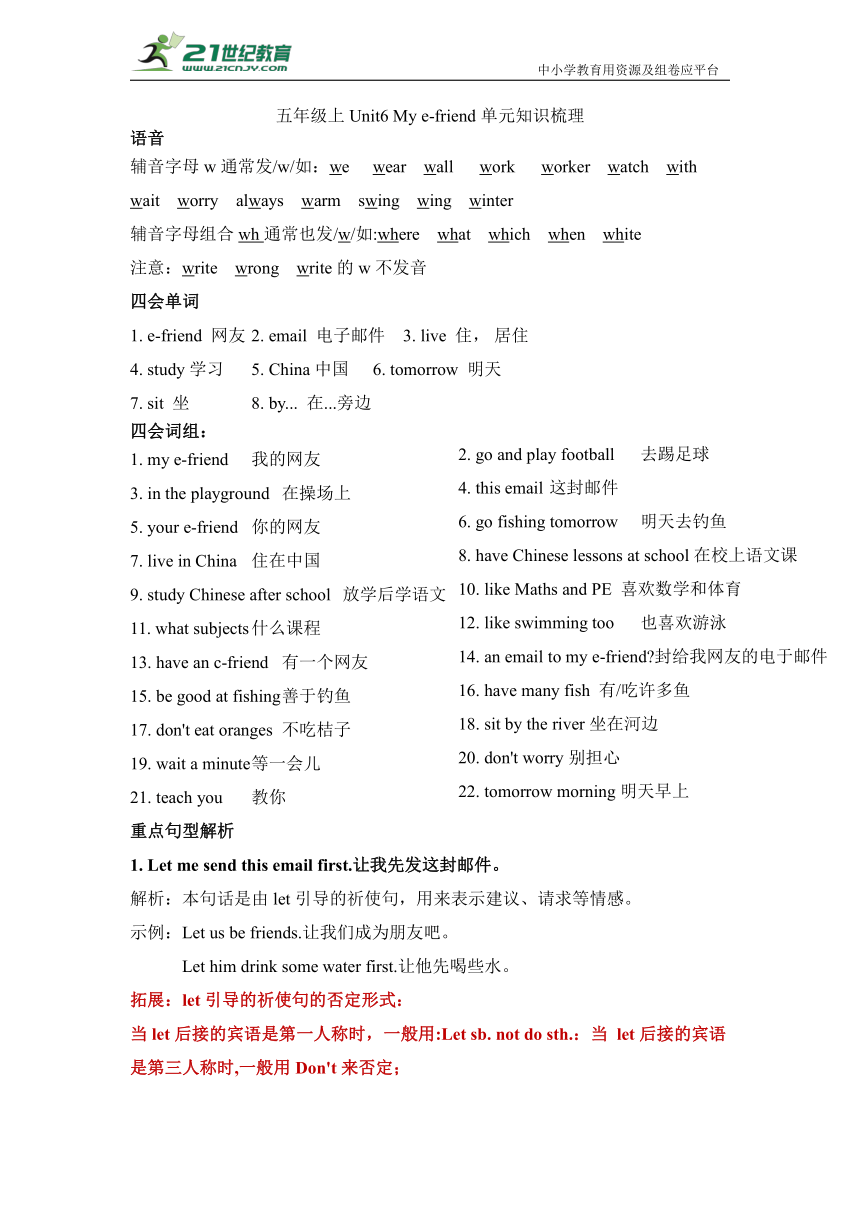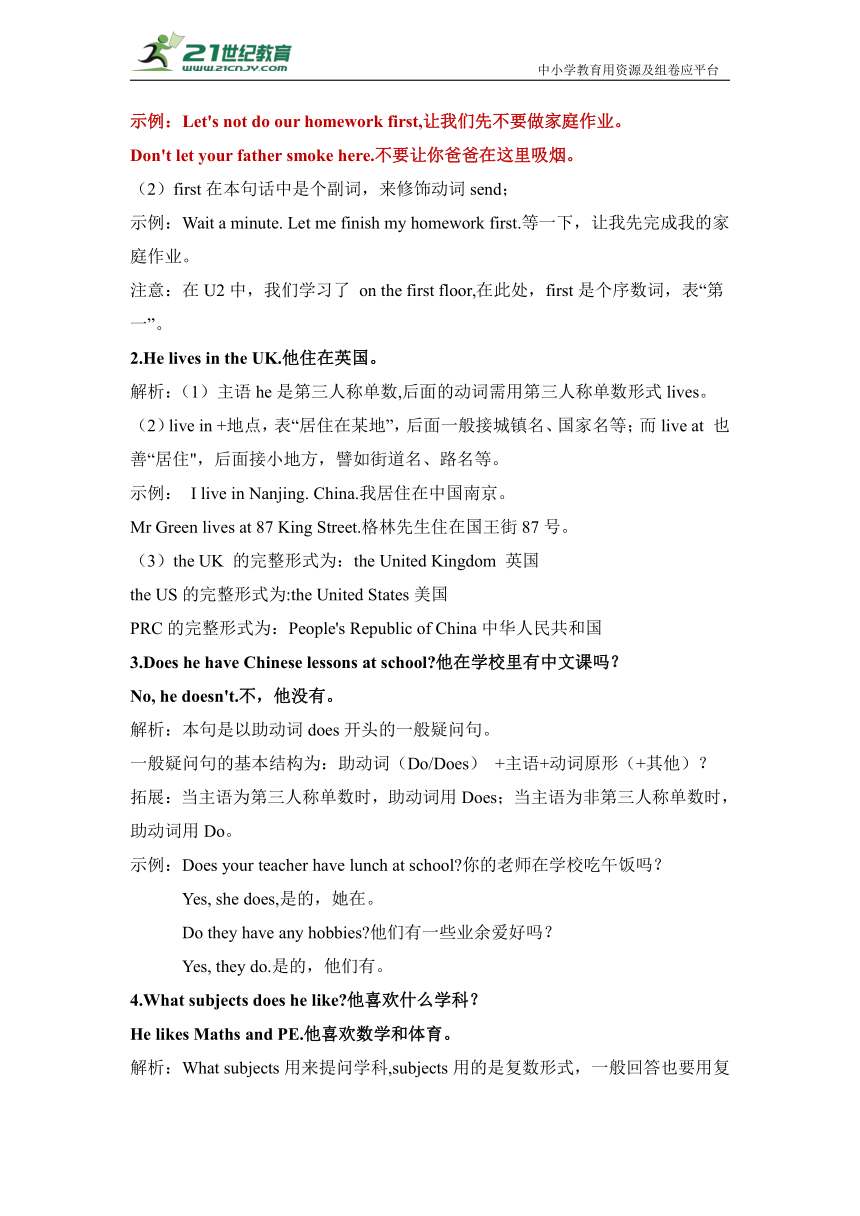牛津译林版英语 五年级上Unit6 My e-friend单元知识梳理
文档属性
| 名称 | 牛津译林版英语 五年级上Unit6 My e-friend单元知识梳理 |  | |
| 格式 | docx | ||
| 文件大小 | 142.5KB | ||
| 资源类型 | 试卷 | ||
| 版本资源 | 牛津译林版 | ||
| 科目 | 英语 | ||
| 更新时间 | 2021-12-07 08:41:18 | ||
图片预览


文档简介
中小学教育用资源及组卷应平台
五年级上Unit6 My e-friend单元知识梳理
语音
辅音字母w通常发/w/如:we wear wall work worker watch with wait worry always warm swing wing winter
辅音字母组合wh通常也发/w/如:where what which when white
注意:write wrong write的w不发音
四会单词
1. e-friend 网友 2. email 电子邮件 3. live 住, 居住
4. study学习 5. China中国 6. tomorrow 明天
7. sit 坐 8. by... 在...旁边
四会词组:
1. my e-friend 我的网友
3. in the playground 在操场上
5. your e-friend 你的网友
7. live in China 住在中国
9. study Chinese after school 放学后学语文
11. what subjects 什么课程
13. have an c-friend 有一个网友
15. be good at fishing 善于钓鱼
17. don't eat oranges 不吃桔子
19. wait a minute 等一会儿
21. teach you 教你
重点句型解析
1. Let me send this email first.让我先发这封邮件。
解析:本句话是由let引导的祈使句,用来表示建议、请求等情感。
示例:Let us be friends.让我们成为朋友吧。
Let him drink some water first.让他先喝些水。
拓展:let引导的祈使句的否定形式:
当let后接的宾语是第一人称时,一般用:Let sb. not do sth.:当 let后接的宾语是第三人称时,一般用Don't来否定;
示例:Let's not do our homework first,让我们先不要做家庭作业。
Don't let your father smoke here.不要让你爸爸在这里吸烟。
(2)first在本句话中是个副词,来修饰动词send;
示例:Wait a minute. Let me finish my homework first.等一下,让我先完成我的家庭作业。
注意:在U2中,我们学习了 on the first floor,在此处,first是个序数词,表“第一”。
2.He lives in the UK.他住在英国。
解析:(1)主语he是第三人称单数,后面的动词需用第三人称单数形式lives。
(2)live in +地点,表“居住在某地”,后面一般接城镇名、国家名等;而live at 也善“居住",后面接小地方,譬如街道名、路名等。
示例: I live in Nanjing. China.我居住在中国南京。
Mr Green lives at 87 King Street.格林先生住在国王街87号。
(3)the UK 的完整形式为:the United Kingdom 英国
the US的完整形式为:the United States美国
PRC的完整形式为:People's Republic of China中华人民共和国
3.Does he have Chinese lessons at school 他在学校里有中文课吗?
No, he doesn't.不,他没有。
解析:本句是以助动词does开头的一般疑问句。
一般疑问句的基本结构为:助动词(Do/Does) +主语+动词原形(+其他)?
拓展:当主语为第三人称单数时,助动词用Does;当主语为非第三人称单数时,助动词用Do。
示例:Does your teacher have lunch at school 你的老师在学校吃午饭吗?
Yes, she does,是的,她在。
Do they have any hobbies 他们有一些业余爱好吗?
Yes, they do.是的,他们有。
4.What subjects does he like 他喜欢什么学科?
He likes Maths and PE.他喜欢数学和体育。
解析:What subjects用来提问学科,subjects用的是复数形式,一般回答也要用复数。也可以用What subject来提问。
示例:
What subject do you like 你喜欢什么学科?
I like English.我喜欢英语。
What subjects does Helen like 海伦喜欢什么学科?
She likes English, Chinese and PE.她喜欢英语、语文和体育。
5.Bobby and Sam eat fish at a snack bar.博比和萨姆在一家小吃店里吃鱼。
解析:在本句话中,fish是名词,意为“鱼肉”,是不可数名词。
There is not much fish on the plate.盘子里没有很多鱼。
(1)用作可数名词时,意为“鱼”。指“鱼的数量”时,单复数形式相同;指 “鱼的种类”时,复数形式为fishes。
示例:There are five fish in the plastic bag.在塑料袋中有 5 条鱼。
There are lots of fishes in the sea.海洋里有很多种类的鱼。
(2)fish用作动词时.意为,“钓(捕)鱼”。
Let’s go fishing tomorrow.让我们明天去钓鱼吧!
6. Sam has many fish, but Bobby does not have any.萨姆有很多鱼,但博比没有鱼。
解析: (1)本句话中fish指的是“鱼的数量”,many修饰可数名词复数,所以fish的复数还是fish。
(2)but是个连词,表转折。
示例:Mike can play football, but his father can't.迈克会踢足球,但他爸爸不会。
I like swimming, but my brother doesn't.我喜欢游泳,但我弟弟不喜欢。
My mother doesn't cook at home, but my father does.我妈妈在家不做饭,但我爸爸做。
语法
1.many, a lot of, lots of 的用法及区别
many, a lot of, lots of都表示“许多”,但many只能接可数名词复数。a lol of和lots of既可以接可数名词复数,也可以接不可数名词。
2.三个国家的首都
Australia 首都:Canberra 堪培拉
the US (the USA / America)首都:Washington 华盛顿
the UK (England/ Britain)首都:-London 伦敦
3.like的用法
(1)like+可数名词复数 表示“喜欢某一类事物”。如:
I like grapes very much.我十分喜欢葡萄。
(2)like + this/that/the+单数表示“喜欢某个事物”。如:
Hike this toy car.我喜欢这个玩具汽车。
(3)like+不可数名词表示“喜欢某物”。如:
I like tea.我喜欢茶。
(4)like +动名词(动词-ing形式)表示"喜欢做某事。如:
They like skating.他们喜欢溜冰。
fish的用法
(1)作为“鱼”时是可数名词。
①指几条鱼,通常用fish (单复同形)。如:three fish(三条鱼),many fish(许多鱼)
②指不同种类的角.,用fishes。如:three fishes(三种鱼),many fishes(许多种鱼)
(2)作为“鱼肉”时是不可数名词。如:I'd like some fish.我要吃鱼肉。
(3)表示“钓鱼,捕鱼”,如:Let’s go fishing tomorrow.让我们明天去钓鱼。
5. send 发,寄
send sb. sth.寄给某人某物=send sth. to sb.把某物寄给某人。
I send four new books to my friend. = I send my friend four new books.
我寄了四本新书给我的朋友。 我寄给我的朋友四本新书。
6. 一般现在时的一般疑问句:
(1)主语为非第三人称单数(即第一人称,第二人称和第三人称复数)的--般现在时的一般疑问句,动词是行为动词时,句型结构为:Do+主语(I/We/You/They) +动词原形...? 肯定回答:Yes, I/we/they do.否定回答:No, I/we/they don't.如:
Do you like skating 你喜欢滑冰吗?
Yes, I do. 是的,我喜欢。
Do they like swimming 他们喜欢游泳吗?
No, they don't. 不,他们不喜欢。
(2)主语为第三人称单数的一般现在时的一般疑问句,动词是行为动词时,句型结构为 Does+ 主语(he/she/it) + 动词原形...
肯定回答:Yes, he/ she/ it does.否定回答:No. he/she/it doesn't.如:
Does she have a rabbit —她有一只兔子吗?
No, she doesn't. 不,她没有。
Does Wang Bing have a storybook 王兵有一本故事书吗?
Yes. he does.是的,他有。
询问某人喜欢什么课程:What subjects do/does +主语+ like 如:
What subjects do they like 他们喜欢什么学科?
They like Maths. 他们喜欢数学。
What subjects does he like 他喜欢什么学科?
He likes Music and Art. 他喜欢音乐和美术。
What subjects do you like 你喜欢什么课程?
I like English. 我喜欢英语。
五年级上Unit6 My e-friend单元知识梳理
语音
辅音字母w通常发/w/如:we wear wall work worker watch with wait worry always warm swing wing winter
辅音字母组合wh通常也发/w/如:where what which when white
注意:write wrong write的w不发音
四会单词
1. e-friend 网友 2. email 电子邮件 3. live 住, 居住
4. study学习 5. China中国 6. tomorrow 明天
7. sit 坐 8. by... 在...旁边
四会词组:
1. my e-friend 我的网友
3. in the playground 在操场上
5. your e-friend 你的网友
7. live in China 住在中国
9. study Chinese after school 放学后学语文
11. what subjects 什么课程
13. have an c-friend 有一个网友
15. be good at fishing 善于钓鱼
17. don't eat oranges 不吃桔子
19. wait a minute 等一会儿
21. teach you 教你
重点句型解析
1. Let me send this email first.让我先发这封邮件。
解析:本句话是由let引导的祈使句,用来表示建议、请求等情感。
示例:Let us be friends.让我们成为朋友吧。
Let him drink some water first.让他先喝些水。
拓展:let引导的祈使句的否定形式:
当let后接的宾语是第一人称时,一般用:Let sb. not do sth.:当 let后接的宾语是第三人称时,一般用Don't来否定;
示例:Let's not do our homework first,让我们先不要做家庭作业。
Don't let your father smoke here.不要让你爸爸在这里吸烟。
(2)first在本句话中是个副词,来修饰动词send;
示例:Wait a minute. Let me finish my homework first.等一下,让我先完成我的家庭作业。
注意:在U2中,我们学习了 on the first floor,在此处,first是个序数词,表“第一”。
2.He lives in the UK.他住在英国。
解析:(1)主语he是第三人称单数,后面的动词需用第三人称单数形式lives。
(2)live in +地点,表“居住在某地”,后面一般接城镇名、国家名等;而live at 也善“居住",后面接小地方,譬如街道名、路名等。
示例: I live in Nanjing. China.我居住在中国南京。
Mr Green lives at 87 King Street.格林先生住在国王街87号。
(3)the UK 的完整形式为:the United Kingdom 英国
the US的完整形式为:the United States美国
PRC的完整形式为:People's Republic of China中华人民共和国
3.Does he have Chinese lessons at school 他在学校里有中文课吗?
No, he doesn't.不,他没有。
解析:本句是以助动词does开头的一般疑问句。
一般疑问句的基本结构为:助动词(Do/Does) +主语+动词原形(+其他)?
拓展:当主语为第三人称单数时,助动词用Does;当主语为非第三人称单数时,助动词用Do。
示例:Does your teacher have lunch at school 你的老师在学校吃午饭吗?
Yes, she does,是的,她在。
Do they have any hobbies 他们有一些业余爱好吗?
Yes, they do.是的,他们有。
4.What subjects does he like 他喜欢什么学科?
He likes Maths and PE.他喜欢数学和体育。
解析:What subjects用来提问学科,subjects用的是复数形式,一般回答也要用复数。也可以用What subject来提问。
示例:
What subject do you like 你喜欢什么学科?
I like English.我喜欢英语。
What subjects does Helen like 海伦喜欢什么学科?
She likes English, Chinese and PE.她喜欢英语、语文和体育。
5.Bobby and Sam eat fish at a snack bar.博比和萨姆在一家小吃店里吃鱼。
解析:在本句话中,fish是名词,意为“鱼肉”,是不可数名词。
There is not much fish on the plate.盘子里没有很多鱼。
(1)用作可数名词时,意为“鱼”。指“鱼的数量”时,单复数形式相同;指 “鱼的种类”时,复数形式为fishes。
示例:There are five fish in the plastic bag.在塑料袋中有 5 条鱼。
There are lots of fishes in the sea.海洋里有很多种类的鱼。
(2)fish用作动词时.意为,“钓(捕)鱼”。
Let’s go fishing tomorrow.让我们明天去钓鱼吧!
6. Sam has many fish, but Bobby does not have any.萨姆有很多鱼,但博比没有鱼。
解析: (1)本句话中fish指的是“鱼的数量”,many修饰可数名词复数,所以fish的复数还是fish。
(2)but是个连词,表转折。
示例:Mike can play football, but his father can't.迈克会踢足球,但他爸爸不会。
I like swimming, but my brother doesn't.我喜欢游泳,但我弟弟不喜欢。
My mother doesn't cook at home, but my father does.我妈妈在家不做饭,但我爸爸做。
语法
1.many, a lot of, lots of 的用法及区别
many, a lot of, lots of都表示“许多”,但many只能接可数名词复数。a lol of和lots of既可以接可数名词复数,也可以接不可数名词。
2.三个国家的首都
Australia 首都:Canberra 堪培拉
the US (the USA / America)首都:Washington 华盛顿
the UK (England/ Britain)首都:-London 伦敦
3.like的用法
(1)like+可数名词复数 表示“喜欢某一类事物”。如:
I like grapes very much.我十分喜欢葡萄。
(2)like + this/that/the+单数表示“喜欢某个事物”。如:
Hike this toy car.我喜欢这个玩具汽车。
(3)like+不可数名词表示“喜欢某物”。如:
I like tea.我喜欢茶。
(4)like +动名词(动词-ing形式)表示"喜欢做某事。如:
They like skating.他们喜欢溜冰。
fish的用法
(1)作为“鱼”时是可数名词。
①指几条鱼,通常用fish (单复同形)。如:three fish(三条鱼),many fish(许多鱼)
②指不同种类的角.,用fishes。如:three fishes(三种鱼),many fishes(许多种鱼)
(2)作为“鱼肉”时是不可数名词。如:I'd like some fish.我要吃鱼肉。
(3)表示“钓鱼,捕鱼”,如:Let’s go fishing tomorrow.让我们明天去钓鱼。
5. send 发,寄
send sb. sth.寄给某人某物=send sth. to sb.把某物寄给某人。
I send four new books to my friend. = I send my friend four new books.
我寄了四本新书给我的朋友。 我寄给我的朋友四本新书。
6. 一般现在时的一般疑问句:
(1)主语为非第三人称单数(即第一人称,第二人称和第三人称复数)的--般现在时的一般疑问句,动词是行为动词时,句型结构为:Do+主语(I/We/You/They) +动词原形...? 肯定回答:Yes, I/we/they do.否定回答:No, I/we/they don't.如:
Do you like skating 你喜欢滑冰吗?
Yes, I do. 是的,我喜欢。
Do they like swimming 他们喜欢游泳吗?
No, they don't. 不,他们不喜欢。
(2)主语为第三人称单数的一般现在时的一般疑问句,动词是行为动词时,句型结构为 Does+ 主语(he/she/it) + 动词原形...
肯定回答:Yes, he/ she/ it does.否定回答:No. he/she/it doesn't.如:
Does she have a rabbit —她有一只兔子吗?
No, she doesn't. 不,她没有。
Does Wang Bing have a storybook 王兵有一本故事书吗?
Yes. he does.是的,他有。
询问某人喜欢什么课程:What subjects do/does +主语+ like 如:
What subjects do they like 他们喜欢什么学科?
They like Maths. 他们喜欢数学。
What subjects does he like 他喜欢什么学科?
He likes Music and Art. 他喜欢音乐和美术。
What subjects do you like 你喜欢什么课程?
I like English. 我喜欢英语。
